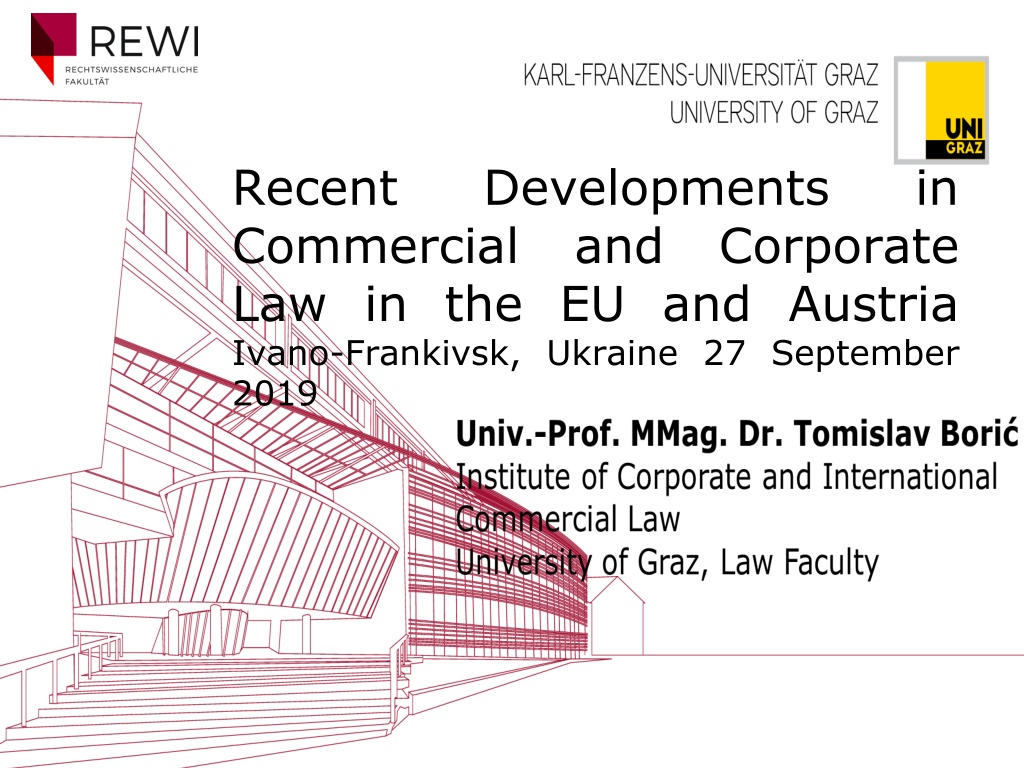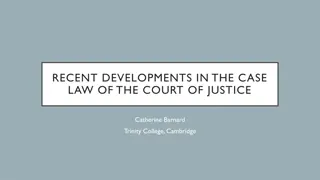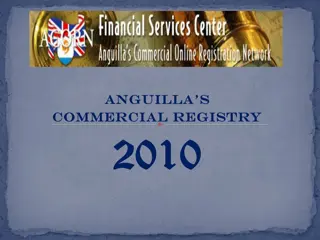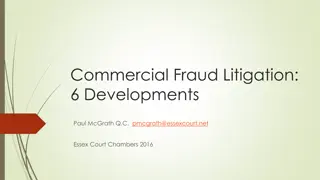Recent Developments in Commercial Law in the EU and Austria
Explore the evolution and key principles of commercial law in the European Union with a focus on Austria. Learn about the legal framework governing commercial transactions, the relationship between commercial and company law, and the supranational aspect of EU commercial law. Delve into the historical timeline of EU legal developments from the European Coal and Steel Community to the Treaty of Amsterdam in 1997.
Download Presentation

Please find below an Image/Link to download the presentation.
The content on the website is provided AS IS for your information and personal use only. It may not be sold, licensed, or shared on other websites without obtaining consent from the author. Download presentation by click this link. If you encounter any issues during the download, it is possible that the publisher has removed the file from their server.
E N D
Presentation Transcript
Recent Commercial Law in the EU and Austria Ivano-Frankivsk, Ukraine 27 September 2019 Developments and in Corporate
General Introduction to Commercial Law in the EU 2
Introduction Commercial law Law reigning commerce and commercial transactions Principles that guide commercial processes and commercial actors Contrast with company law => that area of the law that deals with the organisation of companies Commercial law of the EU Supranational law neither national nor international: first competition law cases before the CJEU (Court of Justice of the European Union) Many aspects of European Union law relate to commercial law 3
Introduction Addressees of EU commercial law Originally: only the Member States (MS) as parties to the Treaties Eg, Article 4(3) TEU: The Member States shall take any appropriate measure, general or particular, to ensure fulfilment of the obligations arising out of the Treaties or resulting from the acts of the institutions of the Union. The Member States shall facilitate the achievement of the Union s tasks and refrain from any measure which could jeopardise the attainment of the Union s objectives. Many rules in the Treaties directly address companies Eg, Article 101 TFEU (prohibiting cartels) Today, individuals are also accepted to be addressees of EU commercial law 4
Introduction Overview: The legal development of the EU 1951: European Coal and Steel Community (ECSC) is founded by Germany, France, Italy, the Benelux countries Ended in 2002 1957: European Economic Community (EEC) and European Atomic Community (EAC) are founded, same six Member States Common market as a common goal To be realised until December 1969 1986: Single European Act (SEA) Used the term single market Community s competences were enhanced 6
Introduction 1989: Delors-plan to set up an Economic and Monetary Union (EMU) was introduced 1992: Treaty of Maastricht on the European Union European Union (EU) was founded Marks departure from a merely economic towards a more political union 1997: Treaty of Amsterdam More co-operation between Member States Role of the European Parliament strengthened Schengen-Treaty was incorporated into the EU New numbering of Articles 7
Introduction 2001: Treaty of Nice To prepare for the numerous accessions in 2004 & 2007 Three pillar model 8
Introduction 2002: Euro ( ) introduced as a common currency 2004: Treaty establishing a Constitution for Europe Signed, but never ratified (negative referenda in France, the Netherlands) 2007: Treaty of Lisbon European Community and European Union were merged (Article 1 TEU), pillar structure abandoned Treaty on European Union TEU Treaty on the Functioning of the European Union TFEU (former Treaty on the European Community, TEC) Charter of Fundamental Rights became binding Internal market remains one of the main goals 9
Introduction Legal sources in the EU Acquis communautaire All legal rules that are legally binding for the MS International Treaties (?) Rank within the EU s legal norm system is disputed Primary law Founding Treaties (TEU, TFEU) Annexes to the Treaties (eg, Protocols) Changes to the Treaties (eg, Treaty of Lisbon) Charter of Fundamental Rights Accession Treaties General principles of law (eg, common constitutional principles) 10
Introduction Secondary law /1 Law enacted by organs of the EU on the basis of primary law Article 288 TFEU: Regulations, Directives, Decisions Regulations Directly applicable in all MS, no implementation necessary Aim at unification Directives Address the MS only Implementation into national law necessary MS can choose the means Aim at substantive harmonization Decisions Address specific addressees (eg, MS, organs of the EU, individuals) Binding for the addressees 11
Introduction Secondary law /2 Recommendations, statements Not legally binding Commission often calls them Guidelines, Notices, Guidance Papers Work in progress at the Commission: Staff Working Documents; Green and White Papers 12
Introduction 13
Introduction The legal bases of commercial law in the EU Article 3(3) TEU: The Union shall establish an internal market. Article 3(4) TEU: The Union shall establish an economic and monetary union whose currency is the euro. Article 3(1) TFEU: The Union shall have exclusive competence in the following areas: (a) customs union; (b) the establishing of the competition rules necessary for the functioning of the internal market; (c) monetary policy for the Member States whose currency is the euro; (e) common commercial policy. 14
Introduction Article 4(2) TFEU: Shared competence between the Union and the Member States applies in the following principal areas: (a) internal market; Article 26 TFEU Internal Market 1. The Union shall adopt measures with the aim of establishing or ensuring the functioning of the internal market, in accordance with the relevant provisions of the Treaties. 2. The internal market shall comprise an area without internal frontiers in which the free movement of goods, persons, services and capital is ensured in accordance with the provisions of the Treaties. 15
Principles of EU Law applicable to Commercial Law 16
Principles of EU Law Direct applicability of EU law Case 26/62 van Gend & Loos [1963] ECR 3 ECJ held that Community (now: Union) law was autonomous and therefore directly applicable Supremacy of EU law Case 6/64 Costa/ENEL [1964] ECR 1253 ECJ stated that Community (now: Union) law has priority over any national law 17
Principles of EU Law Subsidiarity of EU law Article 4(1) TEU: [C]ompetences not conferred upon the Union in the Treaties remain with the Member States. Single market objective Eg, Article 3 TEU Important for interpretative purposes Duty of loyalty Article 4(3) TEU: Member States have a duty of loyalty to the EU Important in EU commercial law, eg for state-owned companies 18
Principles of EU Law Narrow interpretation of exceptions and derogations Case C-234/89 Delimitis [1992] ECR I-935 Are to be interpreted strictly and narrowly Protection of fundamental rights Charter of Fundamental Rights of the European Union Important for interpreting EU commercial law Purposive interpretation of the Treaties Eg, Article 3 TEU and Articles 3 to 6 TFEU Treaties are usually given a purposive, teleological interpretation by the court in the light of the objectives of the Treaties 19
General Introduction to Company Law 20
Introduction Terminology /1 Company = Product of legal imagination: existence assumed by law always formed according to the laws of a state enjoys nationality of the state according to whose laws it was formed acting in another jurisdiction is dependent on recognition by that state National company law different conditions and formations different terminology 21
Introduction Terminology /2 Company in EU law: every entity engaged in an economic activity, the legal status of the financed regardless of in which it is entity and the way (ECJ, C-41/90, H fner/Elser, E.C.R. 1991, I-1979, para 21) 22
Introduction Terminology /3 Company in EU law: Art 54 TFEU: Companies or firms formed in accordance with the law of a Member State and having their registered office, central administration or principal place of business within the Union shall, for the purposes of this Chapter, be treated in the same way as natural persons who are nationals of Member States. Companies or firms means companies or firms constituted under civil or commercial law, including cooperative societies, and other legal persons governed by public or private law, save for those which are non-profit- making. 23
Introduction Terminology /4 2 requirements to be considered as a company: 1. Formed in accordance with the law of a member state (MS) & registered office/administration/business in the EU & legal personality Profit-making 2. 24
Introduction Terminology /5 Registered office = Presence of a company in a state s territory business register Real seat = Location of the companies main administration 25
Introduction Terminology /6 Branch No legal personality No statutory registered office / central administration / principal place of business in the EU Subsidiary Distinct from parent company Statutory registered office of principal place of business in the EU 26
Introduction What is covered by company law ? Formation of companies Dissolution of companies Restructuring of companies Shareholders-rights Reporting standards Corporate governance Tax law 27
Introduction 3 pillars of EU company law 1. National company law and its compatibility with the internal market 2. Harmonisation of national company law 3. Supranational company law National discretion of MS 28
Introduction 1. The internal market and national company law /1 The internal market: Article 26 TFEU 1. The Union shall adopt measures with the aim of establishing or ensuring the functioning of the internal market, in accordance with the relevant provisions of the Treaties. 2. The internal market shall comprise an area without internal frontiers in which the free movement of goods, persons, services and capital is ensured in accordance with the provisions of the Treaties. 29
Introduction 1. The internal market and national company law /2 Primary law and case law Check compatibility of national company law with the provisions of the Treaty Aim: Enhance cross-border mobility Principle: Mutual recognition of companies from another MS 30
Introduction 1. The internal market and national company law /3 4 freedoms: Freedom of goods (Art 28 ff TFEU) Freedom of establishment (Art 45 ff TFEU) Freedom of services (Art 56 TFEU) Freedom of capital (Art 63 ff TFEU) 31
Introduction 1. The internal market and national company law /4 Freedom of establishment To allow an EU national to participate, on a stable and continuing basis, in the economic life of a MS other than his state of origin no situations that are purely internal to a MS! Art 49 and 54 TFEU 32
Introduction 1. The internal market and national company law /5 Freedom of services To provide services to people living in another MS no situations that are purely internal to a MS! Art 56 TFEU 33
Introduction 2. Harmonisation of national company law /1 Based on internal market Secondary law: Regulations and Directives Principle of minimal harmonisation national discretion National act required to implement secondary law into national law Still huge differences in national company laws 34
Introduction 2. Harmonisation of national company law /2 Company law directives e.g.: Takeover Directive Directive on Cross-border mergers Directive on Divisions Directive on Company Accounts etc Important regulations: IAS-Regulation European Insolvency Regulation 35
Introduction 3. Supranational company law /1 Based on internal market Alternatively to national company law Legal instrument: Regulation to ensure uniform regime Background: Lack of trust in certain foreign company forms (e.g. ltd) Enhance cross-border activity 36
Introduction 3. Supranational company law /2 EU company formations: European Economic Interest Group (EEIG) European Cooperative Society (SCE) European Public Company (SE) European Private Company (SPE) European Foundation (FE) European Association (EA) 37
Introduction 3. Supranational company law /3 Hardly accepted In contrast to harmonisation national law is largely untouched Regulations leave potential for national discretion national act required to transform regulation into national law e.g.: Austria: SE-Gesetz 38
Company Law and the Internal Market 39
Company Law and the Internal Market Freedom of establishment Establishment of companies Freedom of services Their interactions 40
Company Law and the Internal Market General remarks /1 Aim: enhance and remove obstacles to cross-border mobility Freedom of establishment / services Short term Subordinate to freedom of establishment Long term: the actual pursuit of an economic activity through a fixed establishment in another MS for an indefinite period 41
Company Law and the Internal Market General remarks /2 ECJ, C-55/94, Gebhard [1990] ECR I-5165: difference between freedom of establishment and services has to be determined by Duration of the provision of services o Regularity o Periodicity o Continuity Some form of infrastructure of provider (e.g. office or consulting rooms) in host state does not imply establishment! 42
Company Law and the Internal Market General remarks /3 No applicability to activities related to the exercise of official authority Official authority = the power of enjoying prerogatives outside the general law, privileges of official power, and powers of coercion over citizens Narrow interpretation o E.g. the activites of notaries are not connected with the exercise of official authority 43
Company Law and the Internal Market Art 49 TFEU: Freedom of establishment /1 Within the framework of the provisions set out below, restrictions on the freedom of establishment of nationals of a Member State in the territory of another Member State shall be prohibited. Such prohibition shall also apply to restrictions on the setting-up of agencies, branches or subsidiaries by nationals of any Member State established in the territory of any Member State. Freedom of establishment shall include the right to take up and pursue activities as self-employed persons and to set up and manage undertakings, in particular companies or firms within the meaning of the second paragraph of Article 54, under the conditions laid down for its own nationals by the law of the country where such establishment is effected, subject to the provisions of the Chapter relating to capital. 44
Company Law and the Internal Market Freedom of establishment /2 Abolition of restrictions Primary establishment Secondary establishment Equal treatment of nationals and non-nationals 45
Company Law and the Internal Market Freedom of establishment /3 Justification of restriction: Art 52 para 1 TFEU The provisions of this Chapter and measures taken in pursuance thereof shall not prejudice the applicability of provisions laid down by law, regulation or administrative action providing for special treatment for foreign nationals on grounds of public policy, public security or public health. 46
Company Law and the Internal Market Freedom of establishment /4 Further justifications (Case law): Consumer protection Preventing crime 47
Company Law and the Internal Market Art 54 TFEU: Establishment of companies /1 Companies or firms formed in accordance with the law of Member State and having central administration or within the Union shall, for the purposes of this Chapter, be treated in the same way as natural persons who are nationals of Member States. Companies or firms means companies or firms constituted under civil or commercial law, including cooperative societies, and other legal persons governed by public or private law, save for those which are non-profit-making. a their registered office, principal place of business 48
Company Law and the Internal Market Establishment of companies /2 Freedom of establishment applies to Establishment by companies Establishment of subsidiaries o Even subsidiaries of foreign companies provided that subsidiaries are formed in accordance with law of a MS No application to branches! specific provisions (e.g. insurance sector or capital market) Removal of discrimination under the conditions laid down for its own nationals 49
Company Law and the Internal Market Establishment of companies /3 Problem of recognition of companies formed in another EU member state Pseudo-foreign companies o Incorporation and actual activity in different MS to avoid stricter domestic requirements Definition of foreign company o 2 Theories: The Incorporation Theory The Real Seat Theory 50























